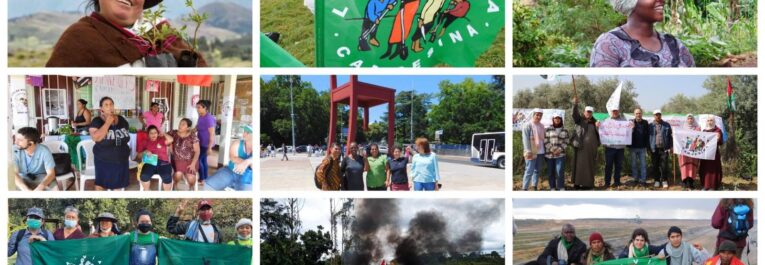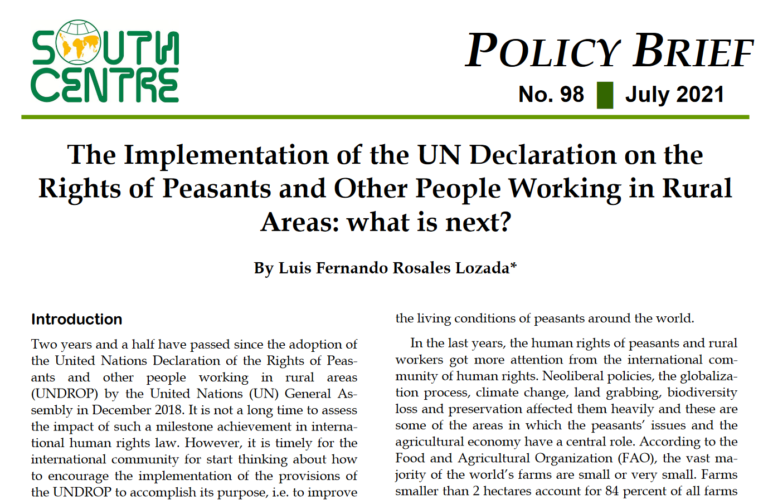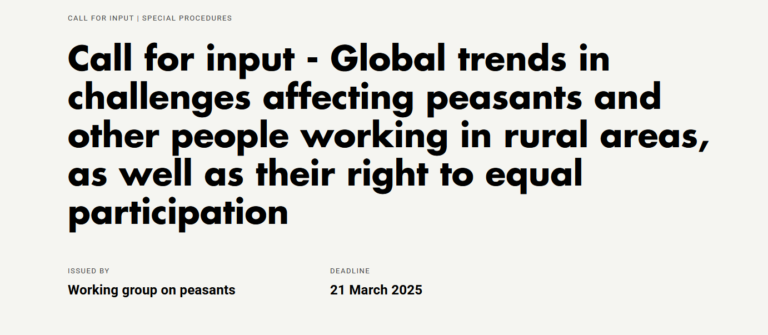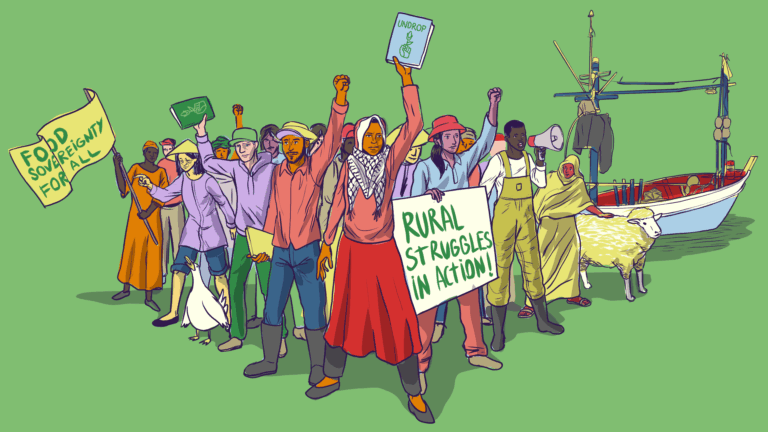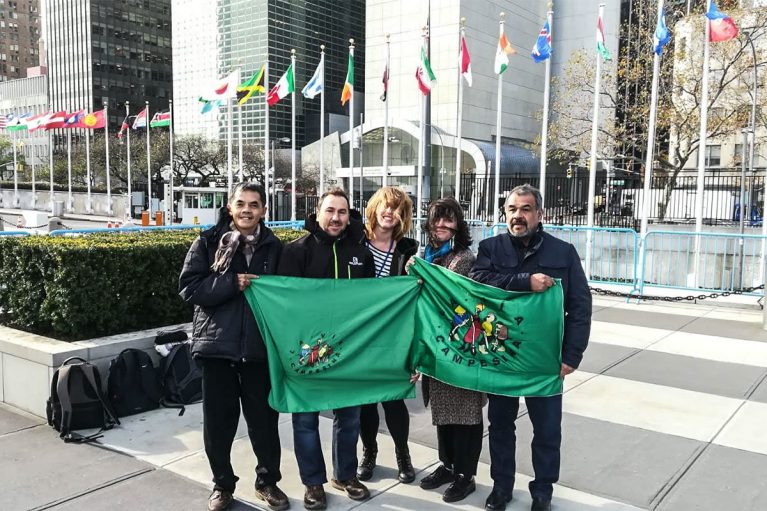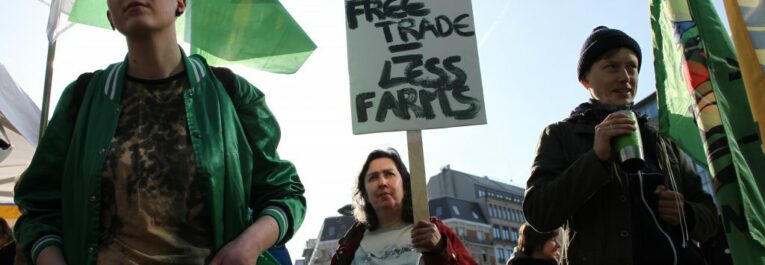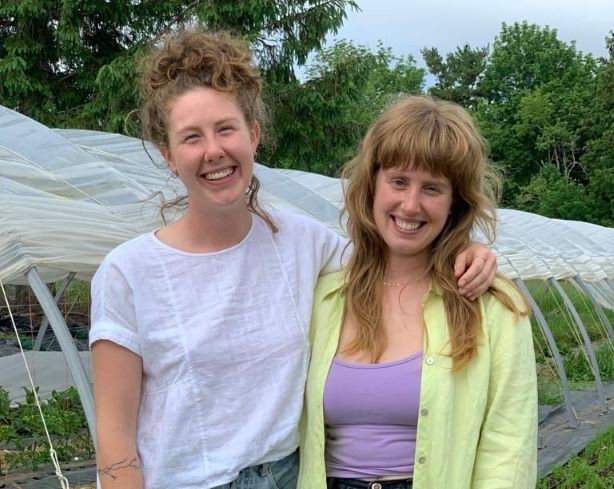UN Special Procedure on the UNDROP urgently needed to achieve social justice and equity and equality
La Via Campesina Press Release
(Bagnolet: December 16, 2022) This December 17th, the fourth anniversary of the international adoption and recognition of the human rights of peasants and other people working in rural areas, we reflect on the strides we have taken towards full implementation and enforcements of peasants’ rights.
On this day in 2018, the UN General Assembly adopted the UN Declaration on the Rights of Peasants and Other People Working in Rural Areas (UNDROP), beginning a new chapter to address peasants’ claims and interests and to ensure respect of their rights.
It is important to highlight from the outset that the implementation of the UNDROP is underway in various forms, though not at the scale and urgency we desired, in many regions and countries[1].
The question of the extent to which states are making rights enshrined in the UNDROP a reality at local level is difficult to answer. The current geopolitical global context is fraught with a disturbing lack of political will to uphold human rights. Unhindered capitalism, protracted conflicts, and the climate crisis continue to deepen inequality; since the adoption of UNDROP in 2018, the world has experienced crisis after crisis. In the last four years, the number of undernourished increased by about 200 million. Hundreds of environmental and community defenders were killed defending the land rights of their people against appropriation by big businesses and state interlocutors. Under the cloud of the COVID-19 pandemic, workers’ rights were severely eroded. Instead of States upholding their obligations to safeguard the rights of marginalized people and to guarantee an enabling environment to address these interwoven crises, many governments look the other way as corporations profit on despair.
The corporate false solutions (known as ‘nature-based solutions’ or net-zero schemes) to the climate crisis are expanding carbon markets and offsets into land and farming are a glaring example. Such solutions are terrible losses for peasants, Indigenous Peoples, fisherfolk, forest dwellers and others on the frontlines of the global climate crisis. Instead of shifting away from fossil fuel-based industrial agriculture and supporting food sovereignty and peasant agroecology – the real solutions to the current crises – many governments and leaders continue to prop up polluters in the interest of short-term economic security.
Women, youth, gender and sexual diversities, migrants, farm workers and other vulnerable people, particularly those living in the rural areas, bear the full brunt of state neglect and negligence. Violence in various forms has increased against these groups as the crises worsen. More and more girls are forced in marriages, women’s sexual and reproductive rights are grossly violated, and basic health care is denied.
Considering the gross injustices against peasants, their families, and other people working in rural areas, La Via Campesina (LVC) calls upon governments to accelerate the implementation of UNDROP at all levels. This is important as it empowers the peasants to improve their livelihoods, reinforce food sovereignty and agroecology, and strengthen the fight against the climate crisis and criminalization of our struggles.
LVC is thus putting forth concrete demands in making UNDROP a lived reality for our communities.
Demand for a UN Special Procedure on the UNDROP
The implementation of UNDROP will only happen through mainstreaming and monitoring at the international level. Therefore, LVC and its allies are leading the struggle for the creation of a Special Procedure on the UNDROP. If created, this mechanism will allow for effective implementation through increased mainstreaming and monitoring at the international level. We call on all our allies, member organizations, and likeminded activists to increase their advocacy efforts in their countries and the UN bodies in support of the creation of the UNDROP Special Procedure at the UN Human Rights Council session scheduled in March 2023. We call on all countries to support peasant communities and to engage in the creation of this new UN monitoring mechanism.
To build better and socially just societies, we urgently need transformative change from destructive, profit driven systems to people-centered systems that work in harmony with nature. A UN Special Procedure on the UNDROP will create a mechanism to begin identifying both rights violations and systemic solutions: we believe this will play an important role in the transformation process.
The Special Procedure, housed within the Human Rights Council, could include a Working Group of Experts or a UN Special Rapporteur which will serve as follow-up mechanisms of the UNDROP, allowing for the monitoring of human rights situations of peasants and other people working in rural areas in different countries, and providing a space for discussion and exchange of ideas on good practices between states and between states and civil society organizations (in particular those organizations made up of the rights holders).
What have we been doing?
LVC members worldwide have brought UNDROP to our bases and grassroots at the national and local level with direct actions, formations, and creation of UNDROP popular materials. We will continue our efforts to translate UNDROP and the popular materials into our local languages to understand and increase ownership over this crucial tool of struggle. We call on our members, right-holders, and our allies to continue to raise awareness and use UNDROP as a tool in their daily fights. Cite and reference UNDROP at every available opportunity, discuss it at meetings, present it to lawyers and government officials, and relate it to personal and community contexts. Spreading UNDROP at the grassroots level is a powerful way to create momentum for change.
The UNDROP Popular Educational Toolkit is ready!
Between 2021 and 2022, LVC with FIAN International developed a UNDROP popular education toolkit to create broader awareness, promote deeper understanding and enhance capacities through training of rural people’s movements to effectively use the UNDROP to assert and advance our collective and individual rights. The toolkit, in 3 languages – English, French and Spanish, comprises of five booklets, an explanatory video, audio script[2] and memes. This toolkit will play a crucial role to reconnect the UNDROP to the small-scale food producers worldwide – the same people who inspired its content, who worked on its development and whose Rights to dignified lives and livelihoods continues to be violated.
A new website to share UNDROP experiences
This month LVC, FIAN, CETIM and the Geneva Academy of International Humanitarian Law and Human Rights are thrilled to launch a shared website dedicated to the UNDROP: Defending Peasants’ Rights:Platform of rural struggles in action! – a broad knowledge base in three languages to share examples of UNDROP in action.
On this December 17th, we both celebrate the efforts of our movement to advocate for and implement the Declaration and call on governments to take urgent steps towards widespread adoption and implementation. There is no more time to waste: peasants and other people working in rural areas are the foundation of our agriculture and food systems and need their rights protected and upheld. We need peasants’ rights NOW!
[1] Bolivia, Canada, Cuba, Colombia, Indonesia, Nepal, Palestine, etc. UNDROP was used as a basis for making recommendations on the application of remedial actions in Paraguay and Argentina.
[2] Available in January 2023

